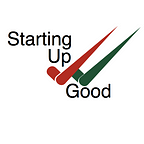COVID-19’s Impact on Entrepreneurs and What to Expect Next
By: Brady Press
This webinar covers addressing the racial wealth gap through entrepreneurship and the impact COVID-19 has had on Atlanta’s entrepreneurs, with panelists from Atlanta Wealth Building Initiative (AWBI) and Access to Capital for Entrepreneurs (ACE) — two Atlanta-based organizations working to provide capital and resources to businesses that often face challenges and inequity in funding.
Webinar Recording
https://changingourworld.com/wp-content/uploads/2021/04/FF-ATL-S6.mp4
This post covers the sixth session from Changing Our World’s Atlanta Forging Forward Conference Series focused on idea sharing, innovative solutions and a path forward within the Atlanta community.
Speakers
Latresa McLawhorn Ryan, Executive Director, Atlanta Wealth Building Initiative (AWBI)
- AWBI is a community building, data-driven intermediary organization leveraging ideas, people and capital to close the racial wealth gap in Atlanta. AWBI provides capacity building grants and loans to nonprofits and small businesses to address systemic barriers to accessing capital. It also helps funders maximize the impact of their dollars and reimagine how they deploy capital to the community.
- Latresa has more than 15 years of experience as a strategic advisor helping entrepreneurs, nonprofits and foundations maximize the impact of their assets to support and align with their missions and personal goals. Prior to joining AWBI, Latresa was the vice president within the Foundations and Endowments Specialty Practice at SunTrust Bank. Formerly, she was an attorney and Director of the Office of Partnerships and Global Vice President of Strategic Partnerships & Development at Operation HOPE.
- She is an active local leader and serves as a board member and former chair of the Grove Park Foundation, member of the Georgia Planned Giving Council, and member of the United Way of Greater Atlanta Community Engagement Council.
Grace Fricks, Founder and CEO, Access to Capital for Entrepreneurs Inc. (ACE)
- ACE is a Georgia nonprofit organization and community development financial institution (CDFI) that helps underserved business owners grow their businesses through capital, coaching, and connections. In 2018, Bank of America and SunTrust Foundation honored ACE for its work providing more than $60 million in loans, assisting more than 900 small businesses, and helping create or retain 7,700 jobs for Georgians.
- Grace founded ACE in 1997 and has since been named one of the 100 Most Influential Georgians by Georgia Trend Magazine and Financial Services Champion of the Year in 2014 by SBA. She received a Vision of Excellence Award by the Atlanta Business League and the Inaugural Lifetime Achievement Award by Startup Atlanta.
- Grace currently serves on the Advisory Board for Atlanta’s Women’s Entrepreneurship Initiative (WEI), the Board of Directors of Appalachian Community Capital, the Fifth Third Advisory Board and Invest Atlanta’s New Market Tax Credit Board.
Key Takeaways
- Because of the heightened disparities brought on by the pandemic, existing issues of income inequality in the US are no longer in question, particularly for the Black community. Supporting Black entrepreneurship is a great avenue to reducing disparities. While data shows that white families are on average 10X wealthier than Black families, according to Grace Fricks, that figure drops to 3 when comparing a white entrepreneur to a Black entrepreneur.
- As funders, we have to do our part to re-evaluate risk. Many Black-owned businesses have trouble accessing capital because the access to generational wealth is different, among other things. For example, Atlanta Wealth Building Initiative gave Brown Toy Box founder Terri-Nichelle Bradley $10K to help with COVID-related losses. While a small amount, the $10K allowed her to stay on her feet for a few months, during which she secured a national partnership with Target.
- Another barrier is access to networks. Do not underestimate the power of relationships; introduce BIPOC entrepreneurs to your networks and vice versa so their businesses can grow.
- To truly remove barriers for social entrepreneurs and social impact organizations, particularly Black-led organizations, it is critical to be proximate to the organization’s work — either directly or by partnering with organizations that are proximate. You can’t evaluate how risky an organization is if you don’t know the organization and/or the community it serves.
- If we don’t take a chance on what is perceived as risk and give people with ideas and determination the assets and resources they need to create economic opportunity, whether that’s a small business or nonprofit, the risk is a lesser quality of life in which we don’t have the restaurants, coffee shops, local nonprofits, etc. that make our communities vibrant.
- The most important thing for entrepreneurs and/or small business owners to do is to understand their financials. Accountants and business development centers can help with this if needed. Cash flow and money management — rather than a small business owner’s skill, service or product — is typically what can save a small business in times of need.
- With federal stimulus packages coming into play for COVID relief, funders, nonprofits and entrepreneurs alike have an opportunity to embrace the idea of a blended finance model — combining cross-sector grants, loans and investments. This is the time to listen better and create new innovative ways of financing that are really going to help people, particularly those who have experienced disproportionate barriers in accessing capital for generations. We need to have the right people at the table driving these shifts to avoid doing more of the same.
- In regard to forging forward after the pandemic, organizations — funders, governments, businesses and nonprofits alike — need to work together to identify what each other’s core competencies are and partner to help each other where possible.
Want to know more?
For more Atlanta Forging Forward coverage, visit our Medium page here and be on the lookout for the next Atlanta Forging Forward discussion on Tuesday, May 25th.
Brady Press is an Associate Director at Changing Our World, where she specializes in building strategic corporate citizenship programs. She is a consultant to SDGCounting and StartingUpGood.
